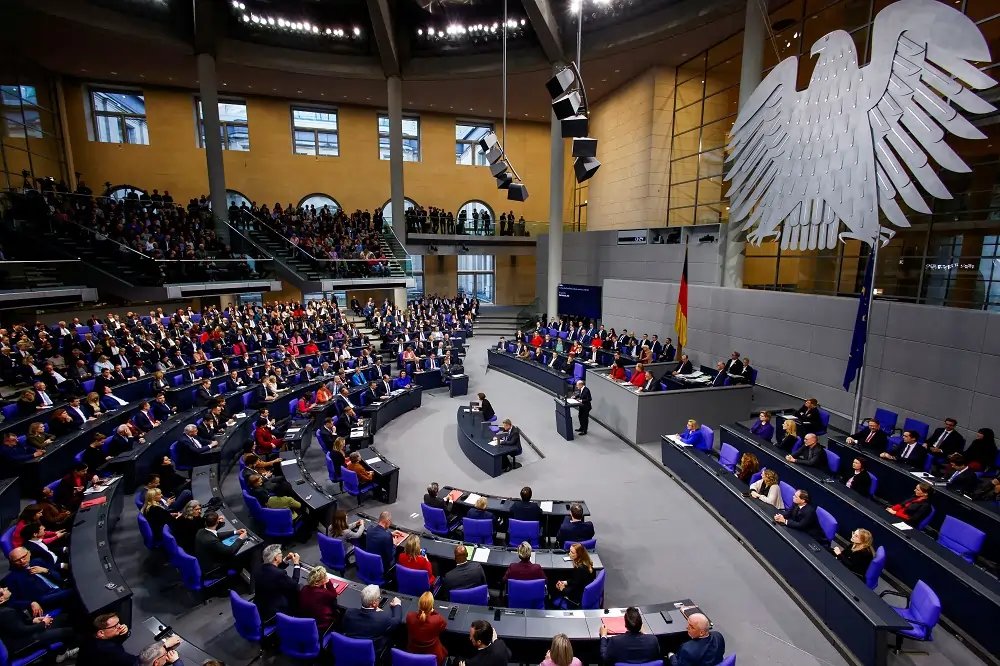QUOTES-Economists on German parties’ election programmes
Published by Jessica Weisman-Pitts
Posted on December 17, 2024
3 min readLast updated: January 28, 2026

Published by Jessica Weisman-Pitts
Posted on December 17, 2024
3 min readLast updated: January 28, 2026

BERLIN (Reuters) -Germans are preparing to go to the polls on Feb. 23 after Chancellor Olaf Scholz lost a confidence vote, and their emphasis will be on the parties’ proposed solutions for the stuttering economy.
BERLIN (Reuters) -Germans are preparing to go to the polls on Feb. 23 after Chancellor Olaf Scholz lost a confidence vote, and their emphasis will be on the parties’ proposed solutions for the stuttering economy.
The election catches Germany at a testing time, with the economy set to shrink for a second straight year, industrial giants like Volkswagen facing existential threats from foreign rivals, and political attitudes hardening towards migrants.
Following are economists’ assessments:
JOERG KRAEMER, COMMERZBANK CHIEF ECONOMIST:
“The German economy is in a deep crisis. This is mainly due to the fact that the quality of the business location has been eroding since the (former Chancellor Angela) Merkel years.”
“A new start in economic policy is needed to prevent manufacturers from moving away. This is about reducing bureaucracy, lower taxes, faster approval procedures, competitive energy prices, high-quality schools and a proper infrastructure. Unfortunately, the polls do not yet indicate a majority for a coherent new economic policy.”
CYRUS DE LA RUBIA, CHIEF ECONOMIST AT HAMBURG COMMERCIAL BANK:
“Word has now gotten around that Germany’s growth problems are of a structural nature. Small-scale measures won’t help – we have to think bigger. You can’t really see that in most of the election manifestos.”
“Of course, it improves morale when income taxes are reduced. And for small businesses, the abolition of the solidarity surcharge is certainly a factor that helps. … But such measures will not ensure that Germany achieves a turnaround.”
HOLGER SCHMIEDING, CHIEF ECONOMIST AT BERENBERG BANK:
“The CDU/CSU and Free Democrats (FDP) would make big strides for Germany as an investment location. Lower taxes, sorting through social benefits, capping additional wage costs, turning energy policy on its head, rational immigration policy with tougher rules for uninvited immigrants.”
“However, both parties have yet to specify how tax relief… and permanently higher defence spending will be possible without a new special defence fund and/or greater leeway in the debt brake.”
OLIVER HOLTEMOELLER, VICE PRESIDENT AT HALLE INSTITUTE FOR ECONOMIC RESEARCH
“The election programs are more wish lists than programs for government action, as many things may not be implemented within the current legal framework of the debt brake. It is uncertain whether there will be a sufficiently large majority that can agree on a concrete change to the debt brake in the Basic Law.”
“The Social Democrats (SPD) do not seem to want to admit that there are not only legal limits to state finances, but also a shortage of resources… We simply have to decide what real resources such as working time and physical capital are used for: People cannot work in care, as teachers, and in the defence industry at the same time.”
“The Christian Democrats (CDU) program is fundamentally pro-business, but it is not thought through in terms of quantity and timing. Even if the measures stimulate economic growth, the tax bases will not increase as much or as quickly as would be necessary to finance them.”
“Some of the Greens’ proposals pursue objectives that are easy to understand, but are not efficient and therefore unnecessarily expensive. For example, the reduction of greenhouse gas emissions works best via the CO2 price and not via purchase premiums and subsidies. Consumption and investment premiums often lead to large windfall profits, which can hardly be avoided.”
(Reporting by Rene Wagner, Writing by Kirsti Knolle, Friederike Heine; Editing by Madeline Chambers and Angus MacSwan)
Gross Domestic Product (GDP) is the total monetary value of all goods and services produced within a country's borders in a specific time period, used as a broad measure of overall economic activity.
Economic growth refers to the increase in the production of goods and services in an economy over a period of time, typically measured as the percentage increase in real GDP.
A financial crisis is a situation in which the value of financial institutions or assets drops rapidly, often leading to a loss of confidence, bank runs, and economic downturn.
Business investment refers to the purchase of goods and services by businesses to increase their productive capacity, which can include equipment, buildings, and technology.
Employment opportunities are the available jobs or positions within a labor market, influenced by economic conditions, industry demand, and workforce skills.
Explore more articles in the Top Stories category











